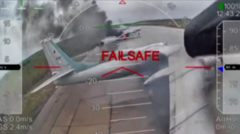Following a significant drone assault by Ukraine on Russian military targets, Donald Trump relayed Putin's strong indication of a need for retaliation. As calls for peace continue amidst military escalations, Trump’s statements reflect the precarious balance of power in U.S.-Russia relations.
Tensions Escalate as Trump Warns of Putin's Retaliation Following Ukraine Drone Strikes

Tensions Escalate as Trump Warns of Putin's Retaliation Following Ukraine Drone Strikes
In a recent phone call with President Putin, Trump highlighted the potential for retaliation after Ukraine’s drone attack on Russian airbases, emphasizing the volatile state of peace negotiations.
Vladimir Putin is poised to respond to Ukraine's recent drone offensive targeting Russian airbases, according to insights shared by Donald Trump after their first conversation since the attacks. Trump reported that Putin indicated a strong necessity to retaliate against the drone assault, which Kyiv executed on June 1 with the intent of disrupting Russian military capabilities.
While there was no official confirmation from Russian authorities regarding Putin's comments, prior statements from Moscow suggested military options were being considered. Trump cautioned that their lengthy discussion would not immediately resolve ongoing conflicts between Russia and Ukraine, a sentiment echoed by Ukrainian officials who hope for increased U.S. sanctions against Russia.
During their call, Trump confronted Putin on the unexpectedness of the Ukrainian strike, acknowledging that the U.S. had not been forewarned of such actions. In the wake of the drone attack, Ukraine's officials expressed their desire for robust U.S. support to counter relentless Russian missile campaigns.
Ukrainian President Volodymyr Zelensky spoke on X, highlighting the futility of diplomatic conversations held thus far, which have yielded no lasting peace resolutions. He emphasized that weak international responses to Russian threats could embolden further aggression on the part of Moscow.
Meanwhile, a Ukrainian delegation is in Washington to discuss military support and strategies to diminish ongoing hostilities, amid an impasse in broader negotiations for peace.
Putin’s communication with Trump also touched upon Iran, with discussions revolving around halting enriched uranium production and the potential for collaboration on nuclear non-proliferation. Despite these talks, Tehran has been reticent to accept U.S. proposals, perpetuating tension in global diplomatic relations.
The interplay of military action, political dialogue, and international diplomacy continues to shape the landscape of the ongoing conflict, as all parties seek to avert further escalation with uncertain prospects for peace.






















